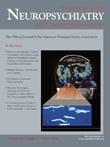To the Editor: Many psychiatric disorders are characterized by impulsive auto-hetero-aggression and violence which are manifested as suicide attempts, self-injurious behavior, or physician-directed violence or domestic violence. The consequences of these behaviors significantly increase costs as they often lead to the patient’s hospitalization and/or property destruction. Borderline personality disorder and body dysmorphic disorder share some similarities such as impulsive aggression, anger, hostility, and irritability associated with moderate to severe depressive symptoms.
Pharmacological approaches to borderline personality disorder have focused mostly on the mood and impulsive aggressive domains, thus leading to the frequent use of combination treatments, mainly selective serotonin reuptake inhibitors (SSRIs), atypical antipsychotics, and mood stabilizers such as carbamazepine or valproate.
1 As for body dysmorphic disorder, SSRIs like fluvoxamine have proven to be beneficial in reducing depressive symptoms, anxiety symptoms, and anger outbursts.
2Lamotrigine is a mood stabilizer with antidepressant properties which has been approved for acute treatment maintenance of bipolar depression; as an anticonvulsant it might possess an anti-aggressive effect.
Our patient was a 26-year-old man diagnosed with borderline personality disorder disorder at the age of 19. He was twice hospitalized mainly due to frequent episodes of inappropriate anger or rage, aggression toward parents, and self-injurious behavior. During our interview we also diagnosed presence of body dysmorphic disorder. His major complaints were depressed mood, loss of interest, irritability, impulsive behavior, and anger outbursts. His depressive symptoms were rated moderately severe—18 points on Hamilton Depression Rating Scale (HAM-D)—while his impulsive aggression was measured with the Overt Aggression Scale (total score=35). We initiated treatment with lamotrigine, 200 mg/day, in order to reduce both symptom domains. We made this decision as the patient responded poorly to the treatment with SSRI and serotonin-norepinephrine reuptake inhibitor antidepressants and second generation antipsychotics.
After 4 weeks of continuous lamotrigine, 200 mg/day, we observed a 50% decrease on the HAM-D, with prominent antiagressive effectiveness (Overt Aggression Scale total score =9). Major benefits were noted on the verbal assault subscale and irritability (4 point decrease). There were no treatment-emergent adverse events.
Our case report suggests that lamotrigine might be an appropriate bimodal-action drug, targeting simultaneously impulsive aggression and depressive symptoms. Larger controlled trials are necessary to establish its exact value and effect size for each of these two symptom clusters often present together in various Axis I and Axis II disorders.

